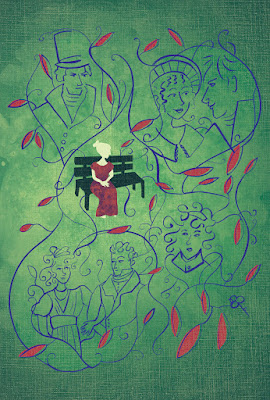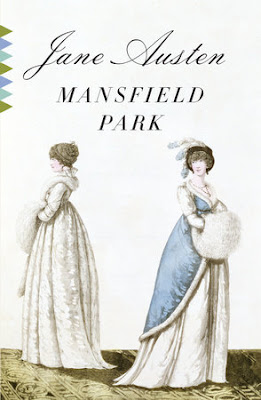Mansfield Park, ch. 17: The Shipping War
 |
| Credit to Laurine Cornuejols for her version of Fanny and her bench of perpetual isolation |
With Edmund coming down from his high horse, his siblings consider his side as having lost the battle as well as the war. In their view of his “selfish inclinations,” his desire for Mary has brought Ed down to their level. Man, for once they see things the same way Fanny does! Too bad it happens under such thorny circumstances. And obviously, they consider the result as a net positive.
Edmund wants to use what influence he has (ha!) to steer Tom away from making the performance public—let’s keep it all in the family, guys. The other shoe to this will drop next chapter.
Fanny’s “indifference to the danger” of being called upon to act wavers because she thinks she’ll be persuaded to join in now that Edmund’s involved. It all but guarantees it. Ed’s happiness hinges on Mary’s continued attentions to Fanny’s sensitivity, and Fanny would never disappoint Edmund by admitting that Mary doesn’t make her feel 100% comfortable. It’s like a mobius strip of awkward. Fanny’s “jealousy and agitation” make her unable to be grateful to Mary, which, though reflecting selfishness on her part, marks this as a turning point in Fanny’s character growth. Her knowledge of Sir Thomas’s disapproval gives her the cover to avoid acting and an authority to check her moral guide against (a function that ol’ Ed can no longer serve). Even her “envy” of Mrs Grant, who has joined the troupe to everyone’s delight, fades pretty quickly. This is Fanny at her most ambiguous. The other shoe to this will drop soon, as well.
But we can’t be like everyone and forget about Julia. Her hurt feelings, combined with her lack for self-reflection, means that we get to experience Mopey Julia. Without any prompting, Henry washes his hands of what little there had been of a courtship. But Mrs. Grant has noticed this shift in pairings. Even after receiving Henry’s “most persuasive smiles” along with his half-lie, she raises the subject with Mary.
Our city girl doesn’t pull punches: Not only does she mock the Bertram sisters for falling for Henry, but she also gets in a dig at Rushworth. Dear Maria best hold onto Mr. Moneybags—she can’t let all that hard work of, you know, being pretty and rich go to waste. I’m not being hyperbolic! Mrs. Grant agrees: “I think [Maria] likes Sotherton too well to be inconstant.” Her little speech is a bit harsh, or at least not as tender as usual. But I believe that there are a couple of things happening here. First of all, this bald statement is supposed to contrast with her warm praise of Sir Thomas. We know she’s being honest because her criticisms of Lady Bertram and Mrs. Norris are spot-on.
Second, and this is a long time coming, we need to acknowledge the reality that Maria is only doing what she’s been asked to do as a proper young lady: hook a rich guy. I rag on her because she’s such a Regina, but Austen doesn’t condemn her characters for looking for someone who will provide them with financial security. Lord knows she didn’t always have that in life. And Maria is expected to snag someone with lots of money and potential for upward mobility. Her parents sure as hell didn’t raise her to be a STEM student. I get that. My admittedly crude criticisms result from her almost sadistic behavior: her palpable disdain of Rushworth, her encouragement of Henry’s attentions, that devil on her shoulder telling her that she can play with fire without getting burned …
Oh, yeah, and the way she treats her sister. Now that she has “felt her triumph, and pursued her purpose, careless of Julia,” the two sisters are estranged for the first time in their lives. And “under such a trial as this, [the sisters have] not affection or principle enough to make them merciful or just[.]” With Julia letting her anger (and genuine feelings) get the better of her, you’d think people would notice. But everyone is absorbed in the play, including Mrs. Norris, happy to save a handful of change here and there so she can triumph in her own war against money. Only Fanny, suffering similar pangs of jealousy, has the space in her heart to feel sorry for Julia.
Honey, you’re better off.
Chapter the next: everyone’s a critic, an awkward rehearsal, and an unexpected guest. Maybe it’s that famous theater producer everyone says will show up! (It is not.)



Comments
Post a Comment